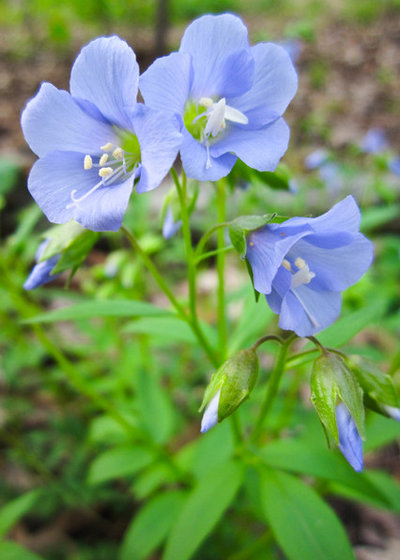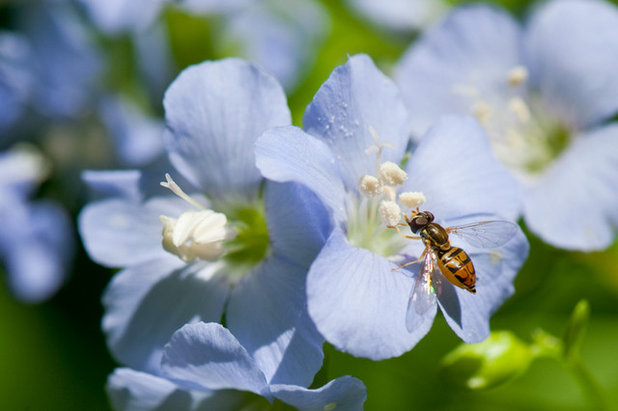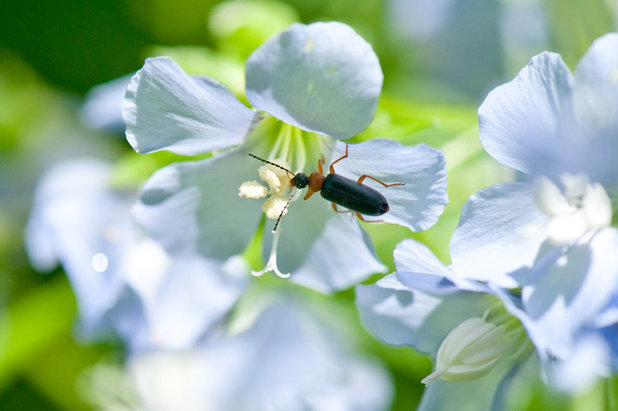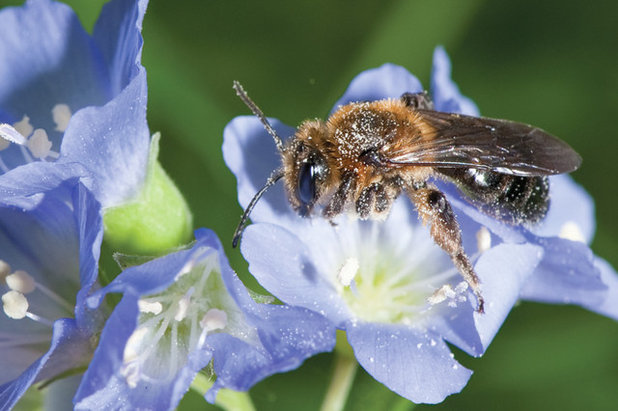The large, light blue flowers of Jacob’s ladder (
Polemonium reptans) provide color and a unique texture in the spring shade garden. Use this easy-to-grow, reliable native plant in any shady garden, whether under trees, intermixed with other spring-flowering wildflowers or naturalized in a woodland understory.
Jacob’s ladder really stands out on its own, as blue is a difficult flower color to come by in early spring. It also provides nourishment to pollinators; the flowers are an important source of pollen for bees along with beneficial insects, such as syrphid flies and even beetles.

Holm Design & Consulting LLC
Botanical name: Polemonium reptansCommon names: Jacob’s ladder, Greek valerian
Origin: Jacob’s ladder occurs in eastern North American woodlands, from the states bordering the Mississippi River eastward to New Hampshire in the north and to Georgia in the south; it is rare in South Dakota southward to Oklahoma; it is absent in North Carolina and Maine and the Atlantic provinces in Canada but does occur in Ontario and Quebec in Canada.
Where it will grow: Hardy to -40 degrees Fahrenheit (USDA zones 3a to 7a; find your zone)
Typical plant communities: Moist to mesic (semidry) deciduous woodlands
Soil requirement: Wet-mesic to medium-dry (mesic-dry) sandy-loam to clay-loam soil
Light requirement: Shade to partial sun
Mature size: 10 to 20 inches tall and 12 inches wide
Benefits and tolerances: Tolerates most soils; prefers woodlands with an ample amount of humus and leaf litter
Seasonal interest: Upright flowers with small clusters of large, showy light blue to violet-colored flowers; flowers begin to open in April or May (depending on latitude)
When to plant: Spring or fall; bare-root or potted plants are available from many native-plant nurseries

Holm Design & Consulting LLC
Distinguishing traits. The foliage of Jacob’s ladder has delicate, small alternate leaflets that resemble ladders. It also has a look that’s similar to that of legumes, such as vetches.
How to use it. This shade-tolerant native plant works well in any shade garden, massed under trees or naturalized in a woodland edge. Mix Jacob’s ladder with other spring-flowering, medium-height woodland perennials, including May apple (
Podophyllum peltatum), baneberry (
Actaea spp), early meadow rue (
Thalictrum dioicum) and largeflower bellwort (
Uvularia grandiflora).
Shown: A syrphid fly (
Toxomerus sp) foraging for pollen

Holm Design & Consulting LLC
Planting notes. Mature plants develop a taproot and therefore do not take well to transplanting. A few seedlings may pop up around the parent plant, but heavy reseeding is unlikely. Small seedlings can be transplanted before a taproot develops. If you want a large, colorful display, use many plants in a cluster.
Jacob’s ladder thrives in partial shade in moist woodlands. Like other woodland wildflowers, an ample amount of leaf litter is necessary to protect the roots from frost, combined with organic matter to provide nutrients to the plants.
Shown: A fire-colored beetle (
Pedilus lugubris) foraging for pollen

Holm Design & Consulting LLC
Pollinator notes. The flowers of Jacob’s ladder produce a small amount of nectar, but most of the pollinators (bees, flies and beetles) visit the flowers to collect or feed on the pollen. Female mining bees are common, and one mining bee species (
Andrena polemonii) is a specialist of
Polemonium,
collecting pollen exclusively from this plant genus.
Shown: A female mining bee (
Andrena sp)





